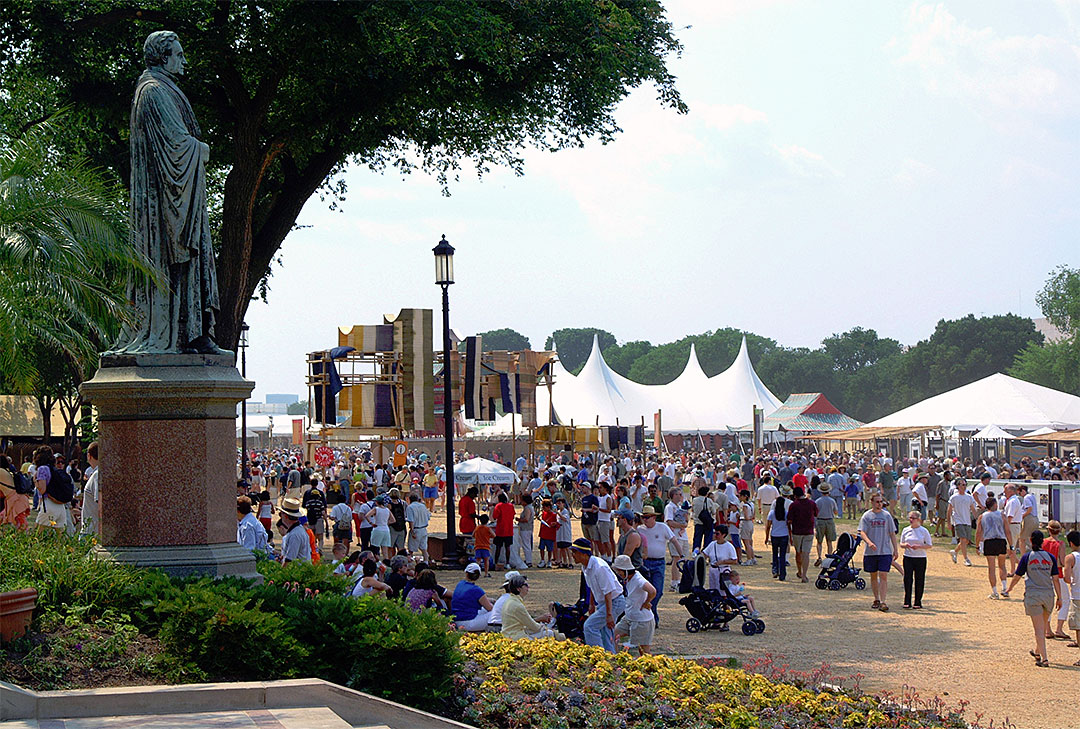Smithsonian's Center for Folklife and Cultural Heritage
Director: Clifford Murphy
Total Full-Time Employees: 45
The Smithsonian’s Center for Folklife and Cultural Heritage promotes greater understanding and sustainability of cultural heritage across the United States and around the world through research, education and community engagement.
The center is a research and educational unit of the Smithsonian that produces the Smithsonian Folklife Festival, Smithsonian Folkways Recordings, the Cultural Vitality Program, the online Folklife Magazine, exhibitions, symposia, publications and educational materials. It also maintains the Ralph Rinzler Folklife Archives and Collections.
Smithsonian Folklife Festival
The Smithsonian Folklife Festival is a research-based presentation of living cultural heritage annually produced outdoors on the National Mall. The multiday event provides a platform for cultural exploration, exchange and engagement. Since its inception in 1967, the festival has highlighted artisans from all 50 states, more than 100 countries and nearly 70 occupations. Free to the public, the festival typically draws hundreds of thousands of visitors and reaches millions more online. In 2010, the Initiative for Global Citizen Diplomacy honored the festival with a Best Practice Award for International Cultural Engagement, and, in 2017, the American Alliance of Museums recognized the festival with a Sustainability Excellence Award.
Smithsonian Folkways Recordings
Smithsonian Folkways Recordings is the nonprofit record label of the Smithsonian. With over 65,000 tracks of music and sound, Folkways is a cultural treasure with unique holdings in traditional music from around the globe, the sounds of the world and iconic American folk songs, including special series dedicated to African American, Asian American and Latino music. To date, the label has won nine Grammy Awards, one Latin Grammy, 11 Grammy Lifetime Achievement Awards and 30 Independent Music Awards.
Cultural Vitality Program
The Cultural Vitality Program (CVP) works with communities to bolster their efforts to maintain their languages and cultural practices. Social, economic and political forces—like urbanization, oppression, war, genocide, climate change and mass production of culture—pressure traditional cultures to assimilate. In the face of these challenges, communities persist in preserving and practicing their living cultural heritage. CVP initiatives, which are divided into Cultural Industries, Language Vitality and Mother Tongue Media, focus on understanding and mitigating threats to cultural vitality; scaling CVP’s impact through partnerships, convenings and thought leadership; and transforming public understanding about cultural diversity.
Ralph Rinzler Folklife Archives and Collections
The Ralph Rinzler Folklife Archives and Collections (RRFAC) at the Center for Folklife and Cultural Heritage serves as a production archives that supports the collections care needs of Smithsonian Folkways Recordings, the Smithsonian Folklife Festival, Curatorial Research and Education, and the Cultural Vitality Program. With more than 5,300 cubic feet of audiovisual media, photographs and documents, the RRFAC is a resource for cultural documentation of grassroots and traditional culture from around the world, maintained with a commitment to digital accessibility and shared stewardship.
# # #
SI-76-2024

